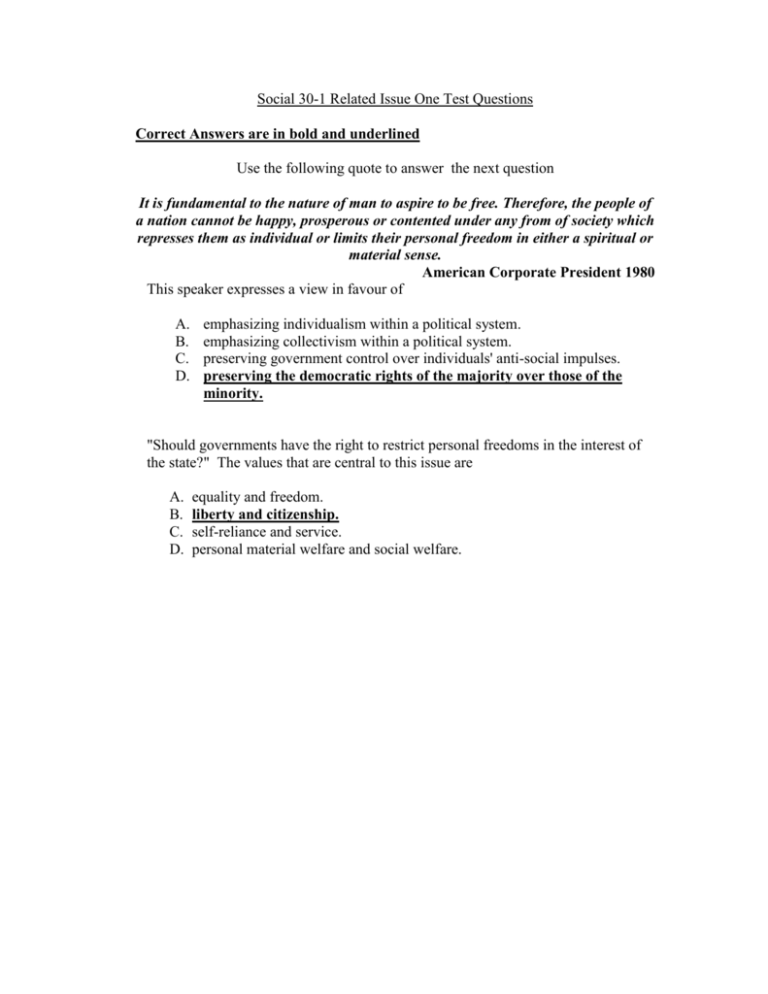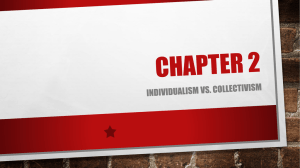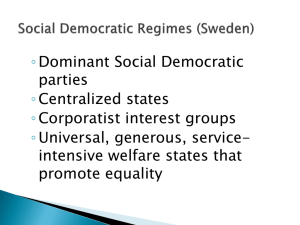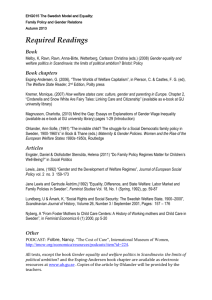SS 30-1.3 (R1)
advertisement

Social 30-1 Related Issue One Test Questions Correct Answers are in bold and underlined Use the following quote to answer the next question It is fundamental to the nature of man to aspire to be free. Therefore, the people of a nation cannot be happy, prosperous or contented under any from of society which represses them as individual or limits their personal freedom in either a spiritual or material sense. American Corporate President 1980 This speaker expresses a view in favour of A. B. C. D. emphasizing individualism within a political system. emphasizing collectivism within a political system. preserving government control over individuals' anti-social impulses. preserving the democratic rights of the majority over those of the minority. "Should governments have the right to restrict personal freedoms in the interest of the state?" The values that are central to this issue are A. B. C. D. equality and freedom. liberty and citizenship. self-reliance and service. personal material welfare and social welfare. Use the sources below to answer the next five (5) questions SOURCE III The public's right --- under carefully prescribed and legal circumstances --- to hire and fire its political leaders is an absolute necessity. If this right is infringed upon or disappears, then free government vanishes. SOURCE IV The role of the masses can be summed up by one phrase: discipline, which implies blind obedience of the citizenship. The citizen becomes a nameless and faceless pawn, an instrument that is manipulated at will by the omnipotent leader. Which of these issues is most clearly raised by the sources? A. B. C. D. Should individual citizens participate in the government? Should governments intervene in the economy? Should leaders be selected on the basis of proven ability? Should the legislative branch of government be separate from the executive? The most important values underlying the structure in Source II would be A. B. C. D. political competition and equality. political freedom and participation. government efficiency and citizen conformity. government flexibility and citizen co-operation. The political structures shown in Sources I and II support the generalization that political A. B. C. D. leaders are elected by majority rule. authority rests with those best able to govern. leaders have complete control over government decision-making. authority can originate from different sources in society. A supporter of democratic ideals would disagree most strongly with the ideas contained in A. B. C. D. sources I and II. sources II and IV. sources II and III. sources I and III. Which solution to the problem of voter apathy would a supporter of the political structure in Source I most strongly favour? A. Passage of laws which require all eligible voters to register and vote in elections. B. Administration of a survey to determine who exercised their right to vote in the last election. C. Introduction of public awareness programs to inform citizens of their democratic responsibilities. D. Passage of laws which require membership in a political party before citizens may vote. Use the following diagram to answer the next question Mr. X believes that legislation should meet these standards: 1. Increase the powers of the central government to solve national economic and social problems Mr. Y believes that legislation should meet these standards: 1. Maintain the power of the federal government only if it respects that of that of the provincial and local governments 2. Increase the number of transfer 2. encourage, by non-interference the payments honest operation of business and industry 3. Promote the general welfare through a 3. Control the rising costs of products system of progressive taxation (inflation) by restricting government expenditures. The value conflict most evident in the positions of Mr. X and Mr. Y is A. B. C. D. self-reliance versus service. personal material welfare versus social welfare. self-advancement versus co-operativeness. economic freedom versus economic equality. Use the following statements to answer the next question SPEAKER I People will always be incapable of handling their own affairs. They are easily deceived and readily swayed by appeals to emotion since the vast majority are decidedly lacking in ability and refinement. Rabble-rousers are more likely to be elected than candidates who are really well qualified to hold public office. SPEAKER II I have confidence that the mass of the people can make broad decisions with intelligence if all relevant information can be placed before them, if the issues can be fully discussed, if the problems are not too technical for the average person, and if there is time for democratic judgments to take hold. The clash of opinions essentially represents a disagreement over the: A. B. C. D. will of the people nature of man advantages of individualism disadvantages of collectivism











